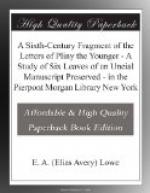Nowadays, however, editors hesitate to accept an unsupported reading of Aldus as that of the Parisinus, since they believe that he abounds in those very conjectures of which Catanaeus felt the lack. The attitude of the expert best qualified to judge is still one of suspicion towards Aldus. In his most recent article,[72] Professor Merrill declares that Keil’s remarks[73] on the procedure of Aldus in the part of Book X already edited by Avantius, Beroaldus, and Catanaeus might safely have been extended to cover the work of Aldus on the entire body of the Letters. He proceeds to subject Aldus to a new test, the material for which we owe to Merrill’s own researches. He compares with Aldus’s text the manuscript parts of the Bodleian volume, which are apparently transcripts from the Parisinus (= I);[74] in them Budaeus with his own hand (= i) has corrected on the authority of the Parisinus itself, according to Merrill, the errors of his transcriber. In a few instances, Merrill allows, Budaeus has substituted conjectures of his own. This material, obviously, offers a valuable criterion of Aldus’s methods as an editor. There is a further criterion in the shape of Codex M, not utilized till after Aldus’s edition. As this manuscript represents Class II, concurrences between M and Ii against a make it tolerably certain that Aldus himself and no higher authority is responsible for such readings. On this basis, Merrill cites twenty-five readings in the added part of Book VIII (viii, 3 quas obvias—xviii, II amplissimos hortos) and nineteen readings in the added part of Book X (letters iv-xli), which represent examples “wherein Aldus abandons indubitably satisfactory readings of his only and much belauded manuscript in favor of conjectures of his own."[75] Letter IX xvi, a very short affair, added by Budaeus in the margin, contains no indictment against Aldus.
[Footnote 72: C.P. XIV (1919), pp. 29 ff.]
[Footnote 73: Op. cit., p. xxxvii: nam ea quae aliter in Aldina editione atque in illis (i.e., Avantius, Beroaldus, and Catanaeus) exhibentur ita comparata sunt omnia, ut coniectura potius inventa quam e codice profecta esse existimanda sint et plura quidem in pravis et temerariis interpolationibus versantur.]
[Footnote 74: But see above, p. 62, n. 2.]
[Footnote 75: Pp. 31 ff.]
[Sidenote: Aldus’s methods in the newly discovered parts of Books VIII, IX, and X]
The result of this exposure, Professor Merrill declares, should convince “any unprejudiced student” of the question that “Aldus stands clearly convicted of being an extremely unsafe textual critic of Pliny’s Letters."[76] “This conclusion does not depend, as that of Keil necessarily did, on any native or acquired acuteness of critical perception. The wayfaring man, though a fool, need not err therein."[77] I speak as a wayfarer, but nevertheless I must own




